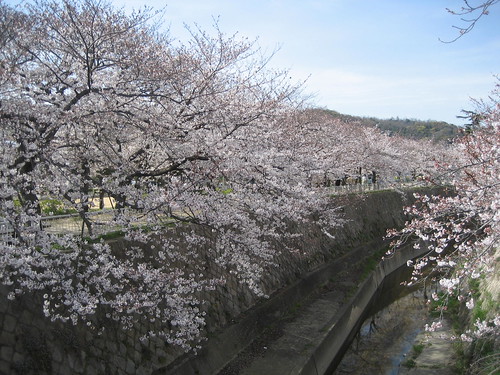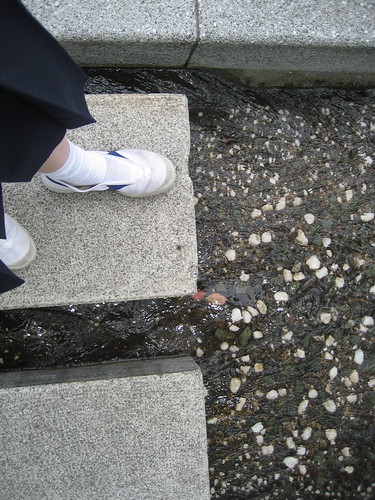The Japan Paradox
22/07/2010There’s lots of good reasons to live in Japan for a while — learn about a vastly different culture, pick up a new language, learn to love eating octopus, memorize every Arashi song ever created…
…but I’ve discovered there’s one great and often overlooked benefit of spending time in Japan: never be at a loss for words again, especially in large groups of people you don’t know.
(Not because you should pull the Japan card whenever possible and start shoving stories full of wa down everyone’s throats… no one likes that.) Instead, it’s because of what I like to call “The Japan Paradox”.
Background
Ever heard of the Birthday Paradox? It says that once you get more than 23 people in a room together, it’s more likely than not that at least 2 people share a birthday. Just 23 people!! It’s counterintuitive, but true if you do the math.
Japan Paradox Algorithm
Now, being a computer scientist, I’m rather fond of algorithms. Earlier this summer, I started to notice that I had developed an algorithm for functioning in group social situations where I was meeting new people. In particular, that meeting new people used to be difficult for me but isn’t as bad anymore. Part of this could be attributed to maturity (ha!), but the rest is most certainly the Japan Paradox. Here’s my algorithm:
If there are more than 4 people present:
1. Find the person in the group who has lived in Japan before
2. Talk to them about Japan
3. Oh look, it’s already time to go??
“But wait!” you must be thinking, “How do you come across so many people who happen to have lived in Japan/know Japanese/have some kind of connection to Japan?” Well, that’s what makes it a paradox!
Seriously though, this has happened to me on numerous occasions, and yes, usually in groups of people I have never met before. The most recent example of this, Exhibit A, was a MeFi meetup I attended a couple of weeks ago here in Pittsburgh. I came in, sat down, and my username (mokudekiru) drew attention from a guy who had apparently lived in Japan for 3 years! Who knew. Culture shock anecdotes and jdrama recommendations flying back and forth, and now I’m doing some Japanese help via email for one of his friends trying to learn Japanese (if the people I’m talking about here are reading this…well, hi!) The meetup was around 10-12 people while I was present.
The Wa-dar
The only potentially tricky step of my algorithm above is step 1. You sort of have to look for little signs that another Japan-er might be in your midst. Thanks to my coincidentally Japanese-sounding name, they usually ask me and I can say “no, I’m not, but I lived there…” and it’s on. Otherwise, making references to matcha or eating octopus might do the trick, as well as being on the lookout for little references others will make. And sometimes, you don’t know what it is about the person, but you just have a hunch. Hence, wa-dar. I’m still perfecting mine.
Demographics of the Japan Paradox
Okay okay, so it has to be related to the people I hang out with — clearly if you pick four people off the street in podunk Wyoming, there’s not a high chance you’ll find your Japan person. As a computer science student, I mostly run around in circles of well-educated engineers, undergrads, grad students, and the youngest part of the workforce.
I have definitely noticed some sort of engineering-Japan Paradox connection though. Both last summer and this summer, I’ve participated in research internships for computer oriented types (last year was CS/ECE, this year the research is in the learning sciences, so CS, Psych, and Linguistics). The two internships were on opposite sides of the country, and each consisted of ~15 undergrads. Both last year and this year, out of each group of 15 there were THREE people who had lived in Japan before. That’s 20%. Back at school, there’s an insane number of CS/ECE kids who have gone to Japan or at least are taking Japanese, and on the flip side, in J-Net, the Japan Club for our university, outside of East Asian Languages and Cultures majors, engineers are probably the next most represented (disproportionately so, given the size of the engineering school vs. the rest of the university).
It’s also a time/age thing. Even when I lived there (’06-’07) I didn’t feel like it was such a big thing as it is now — now it’s almost to the point of absurdity where I feel like every engineer takes a summer there. Not that this is a problem — comparing Japan stories is endlessly entertaining, and with a large number of people interested, but perhaps not having gotten to the living-in-Japan stage, having Japan-related expertise is highly valued.
So, if you find yourself in a group of 18-30 year old educated engineers, my Japan Paradox Algorithm is likely to succeed. Otherwise, YMMV, and I think we’d need some real demographic info about who learns Japanese and/or visits Japan from the US, to find out whether the Japan Paradox is more generalizable. Please comment if you have a Japan Paradox story or opinion!





